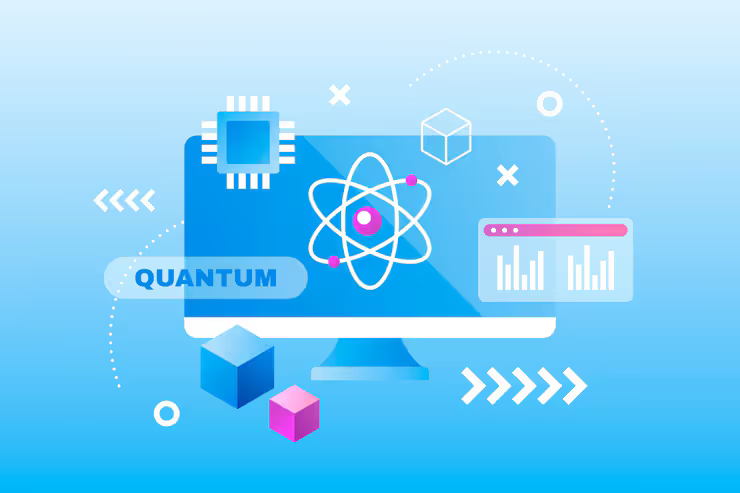Quantum Computing Explained for Beginners
Quantum is a revolutionary approach to data processing that uses the principles of quantum physics. Unlike the classic computers using pieces (0 or 1), the Quantum Computer Computer Qables, which can be present in many states at a time. This allows them to treat a large number of opportunities at the same time.
Quantum calculation is no longer theoretical - its practical implications are more visible in many industries.

Who it affects
-
Scientists solving chemistry or physics problems.
-
Businesses working on logistics, finance, or machine learning.
-
Governments interested in cybersecurity.
-
Students and educators preparing for future tech jobs.
Problems it solves
-
Accelerates drug discovery and chemical reactions modeling.
-
Enhances cryptography and data security.
-
Optimizes financial portfolios and logistics routes.
-
Enables better simulation of materials and quantum systems.
As global data grows and demands increase, quantum computing offers solutions that classical machines can't handle efficiently.
Newer updates and global development
Quantum Machine Progress
In the previous year, Quantum Hardware developers provided big milestones. Some machines are now working with more than 100 qubles and have begun to implement basic quantum corrections, which is an important requirement for the construction of large, reliable systems.
Commercial access expansion
Many companies began to provide cloud-based access to quantum machines. This makes it easier for researchers and developers all over the world to use and innovate.
Academic education
Universities and technical institutes have introduced quantum calculation courses and complete academic programs. It helps to create a skilled workforce over the next decade.
Projects funded by the government
Many countries have introduced national programs and funds to support quantum research. They are focused on quantum algorithms, communication networks and hardware designs.
Quantity Success
Significant success included the performance of "Magic State Distillation", which is a step towards incorrect-toller quantum calculation-something which means that quantum machines will soon make less mistakes.
Government policy and laws that form quantum computer
Governments worldwide invest in quantum calculation due to national security, technical management and ability to influence economic development.
National Program
-
Many countries now have an official quantum assignment or strategy.
-
Quantum R&D budget is within the scope of billions of dollars from hundreds of crores.
-
Quantity is often listed in policy documents under "important and new technologies".
Data Safety Act
Because Quantum computing can break traditional encryption, the authorities work with quantum cryptography standards to protect sensitive data.
Export and security check
Some countries regulate the exports of hardware and software related to quantity.
Quantum talent and technologies become national security funds.
Education cooperation
Public universities receive grants to build laboratories, rent the faculty and start student programs.
These laws and guidelines form a global ecosystem where innovation is encouraged, but closely monitored.
Tools and Resources for Learning Quantum Computing
Quantum computing may sound complex, but there are beginner-friendly tools and platforms to get started.
Learning Platforms
-
Online tutorials and open-source libraries for programming quantum circuits.
-
Virtual courses and certifications offered by educational platforms.
-
Interactive simulators to visualize how qubits work.
Development Kits
-
Software packages that allow users to build and test quantum algorithms.
-
Toolkits that combine quantum and classical computing models.
Public Access to Quantum Machines
-
Cloud platforms allow users to run code on real quantum processors.
-
Free tiers are available for students and independent researchers.
Research Tools
-
Visualization tools for quantum states (e.g., Bloch spheres).
-
Data tracking tools for qubit stability and error rates.
These resources help beginners, students, and even professionals start exploring without needing physical quantum hardware.
Frequently asked questions (common questions)
What does quantum calculation make different from classic data processing?
Classic computers use pieces (0 or 1), while Quantum Computer uses Qualbits, which can be 0, 1 or both at a time. This makes Quantum data processing more powerful for some complex features.
Is Quantum Computing available today?
Yes, basic quantum computer machines are available through cloud platforms. Although they are not yet mainstream, they are used for research, development and preliminary phase industry.
Will the Quantum Computer replace traditional computers?
Not quite. Quantum computer will work with classic systems. They are designed for specific tasks that require intensive calculation power.
Is Quantum data processing safe?
Quantuma machines can break some current encryption methods, which is why "quantum-sax" cryptography is developed in parallel.
Can I learn quantum calculation without physics background?
Yes. Many online resources are designed for beginners with programming or math skills. Courses and simulators help you learn step by step.
